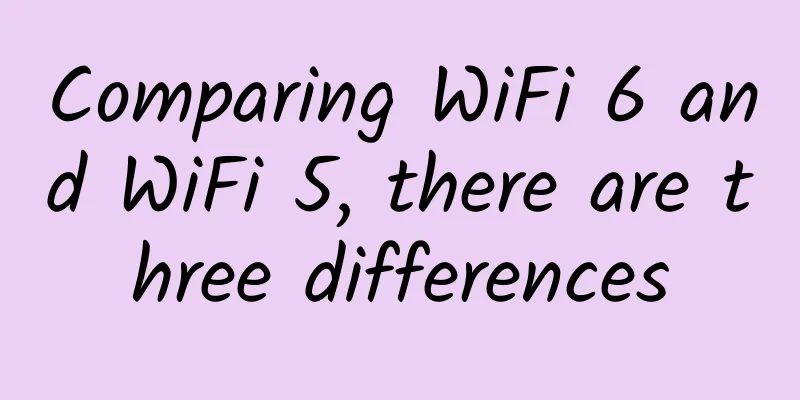Comparing WiFi 6 and WiFi 5, there are three differences

|
The shopping festival is here. If you want to grab the discounted products you have been longing for, you need a fast Internet connection! Apart from the external network bandwidth factor, the WiFi connection between the mobile phone and the wireless router is very important. At present, WiFi 6 routers are already the main sales force of major e-commerce websites, but many users are still using WiFi 5 wireless routers. Many friends around me still don’t understand what is the advantage of WiFi 6 compared to the current WiFi 5? And why should I upgrade to a WiFi 6 router? Just look at the comparison below to know! Many friends even asked why they suddenly changed their names to WiFi 5 and WiFi 6? In fact, WiFi 5 is the original 802.11ac wireless protocol, and WiFi 6 is the latest 802.11ax wireless protocol. In 2019, with the official certification of the 802.11ax protocol, the WiFi Alliance officially named the 802.11ax wireless protocol as the WiFi 6 wireless protocol. In addition, the previous generation of wireless protocols are analogous to WiFi 5 (802.11ac), WiFi 4 (802.11n)... First, let's take a look at the characteristics of WiFi 6. Compared with the most popular WiFi 5, WiFi 6 is faster, supports more concurrent devices, has lower latency, and lower power consumption. WiFi 6 uses the OFDMA technology that is the same as 5G, combined with 1024-QAM high-order modulation, which can support a maximum bandwidth of 160MHz, which is nearly three times faster than WiFi 5. Intelligent frequency division technology can support more devices concurrently and increase the access device capacity by 4 times. Multiple concurrent access devices can reduce queuing, actively avoid interference coloring, and reduce latency by two-thirds. When the terminal device is on standby, it supports on-demand wake-up function, which reduces terminal power consumption by 30%. We can compare the scenario of router-to-device transmission to a fleet. Under the Wi-Fi i5 standard, a fleet can only deliver to one customer at the same time. Even if there are empty cars, they will be dispatched as usual. If a car breaks down (is interfered with), the entire fleet cannot be dispatched. Under the WiFi 6 standard, a fleet that departs at the same time can form a small team of at least 26 adjacent cars. Each team can deliver to different customers. If a car breaks down (is interfered with), it only affects the team it is in. When we are at home, we often find our neighbors' WiFi signals, which can interfere with our own WiFi transmissions. The interference coloring technology used by WiFi 6 can mark neighboring network signal frames that pass through walls, allowing the user's router to ignore them. The WiFi signals between neighbors can transmit data simultaneously on the same channel without interfering with each other, reducing the interference rate by 30%. The power consumption of WiFi 6 and WiFi 5 is very different. WiFi 6 will negotiate with the terminal on the WiFi wake-up time to wake up on demand, and no power is consumed during other sleep time. WiFi 5 can only communicate with one device at a time, and all terminals connected to the same route are either in transmission state or in waiting state, and they are disorderly, and the waiting state still consumes power. It can be seen that WiFi 6 surpasses WiFi 5 in all aspects. Currently, laptops, smartphones, tablets and other products launched in the second half of 2019 are all equipped with WiFi 6 wireless network cards. If users upgrade their home routers to WiFi 6 routers, they can enjoy a faster WiFi Internet experience. Therefore, it is still necessary to replace the WiFi 6 router. However, if there is no WiFi 6 terminal at home, it is not necessary to upgrade the WiFi 6 router. |
<<: Manufacturers begin to correct mistakes, is 5G adjusting its direction?
Recommend
Sharktech: $129/month-Dual E5-2678v3/64GB/1TB NVMe/1Gbps unlimited traffic/Los Angeles data center
Sharktech's low-priced configurations in Los ...
Forcepoint releases 2017 cybersecurity predictions
[[179053]] Forcepoint , a global cybersecurity le...
Let’s talk about the truth about 5G cars
[[259646]] Under the global consensus that "...
Do you understand the benefits of 5G? Learn about the pros and cons
We talk about 5G every day, but do you know what ...
If 12345G were in a WeChat group, what would they talk about?
[[269676]] Scene 1 The development and rise and f...
Operators are satisfied with 4G, what can they do after 5G is commercialized?
In the early stage of 4G development, the dividen...
How data centers work today and in the future
The data center of the future will rely on cloud ...
XSX: $47.9/year-1GB/20GB/600GB/100-500Mbps/Japan & Singapore & Hong Kong CN2 optional
XSX is the original PZEA renamed. The merchant ha...
What you should know about 5G
When it comes to 5G, the most classic and intuiti...
“Number Portability” is launched nationwide! Who will be the next “pain point” to be solved?
The national "number portability" servi...
TNAHosting: 500GB hard drive VPS from $4 per month, 4GB memory VPS from $4 per month
TNAHosting recently held a Happy Near Year event,...
How to test your network with PerfSONAR?
[51CTO.com quick translation] PerfSONAR (https://...
The 5G era is coming. How do the three major operators plan their layout?
With the continuous development of science and te...
Kunpeng Programmers Spread Their Wings and You Are Here | See you in Shenzhen for the 1024 Kunpeng Programmers’ Day series of events!
On October 24, the 1024 Kunpeng Programmer's ...
How Wi-Fi 6 and 5G are ushering in a new era of edge connectivity
[[353891]] Today, the number of IoT devices is gr...









